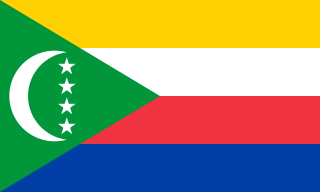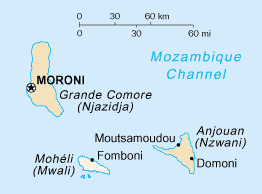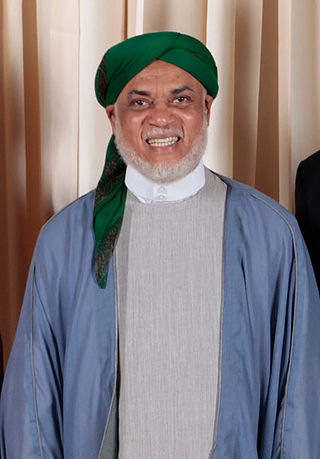
The Comoros, officially the Union of the Comoros, is an archipelagic country made up of three islands in Southeastern Africa, located at the northern end of the Mozambique Channel in the Indian Ocean. Its capital and largest city is Moroni. The religion of the majority of the population, and the official state religion, is Sunni Islam. Comoros proclaimed its independence from France on 6 July 1975. The Comoros is the only country of the Arab League which is entirely in the Southern Hemisphere. It is a member state of the African Union, the Organisation internationale de la Francophonie, the Organisation of Islamic Co-operation, and the Indian Ocean Commission. The country has three official languages: Shikomori, French and Arabic.
The history of the Comoros extends back to about 800–1000 AD when the archipelago was first inhabited. The Comoros have been inhabited by various groups and sultanates throughout this time. France colonised the islands in the 19th century, and they became independent in 1975.

The Politics of the Union of the Comoros take place in a framework of a unitary presidential republic, whereby the President of the Comoros is both head of state and head of government, and of a multi-party system. Executive power is exercised by the government. Legislative power is vested in both the government and parliament. The precolonial legacies of the sultanates linger while the political situation in Comoros has been extremely fluid since the country's independence in 1975, subject to the volatility of coups and political insurrection.

Azali Assoumani is a Comorian politician and military officer who has served as the President of the Comoros from 2002 to 2006 and again since 2016, except for a brief period in 2019. He became head of state after staging a coup d'état in 1999 and was elected president in 2002, 2016, 2019 and 2024. He also served as Chairperson of the African Union from February 2023 to February 2024.

Parliamentary elections were held in the Comoros on 18 April 2004, with a second round on 25 April. The result was a victory for the Camp of the Autonomous Islands, which won 12 of the 18 elected seats.

Mohéli, also known as Mwali, is an autonomously-governed island that forms part of the Union of the Comoros. It is the smallest of the three major islands in the country. It is located in the Indian Ocean off the coast of Africa and it is the smallest of the four major Comoro Islands. Its capital and largest city is Fomboni.

Elections in the Comoros take place within the framework of a multi-party democracy and a presidential system. The President and the majority of the seats in the Assembly of the Union are directly elected.

Presidential elections were held in the Comoros on 21 February 2016, with a second round to be held on 10 April 2016, alongside elections for the Governors of the three islands. A re-run of the second round was held in thirteen constituencies on Anjouan on 11 May. Azali Assoumani of the Convention for the Renewal of the Comoros was elected President with 41% of the vote.

Sayyid Ahmed Abdallah Mohamed Sambi is a Comorian Islamic leader and politician, and former President of Comoros. He is popularly known as 'Ayatollah'. After easily winning the 14 May 2006 presidential election with 58.02% of the national vote, Sambi was inaugurated as President of the Union of the Comoros on 26 May 2006. It was the first peaceful transfer of power in the history of the Comoros.
Ibrahim Halidi was a long-time politician in Comoros. Halidi was the Prime Minister of Comoros from January to May 1993. Halidi also ran for president in May 2006 with the backing of the outgoing president, Azali Assoumani. In the first round of the election, Halidi finished in third place with 10.37% and qualified for the presidential second round, which was held on 14 May. Halidi lost the presidential election to Ahmed Abdallah Sambi. Ibrahim Halidi was supported by the Islands' Fraternity and Unity Party (CHUMA), Convention for the Renewal of the Comoros (CRC), Movement for the Comoros (MPC) and the Djawabu Party (DJAWABU).

The president of Grande Comore, is the head of the autonomous government of Grande Comore (Ngazidja), the largest island of the Comoros. The position was established in 2002 following the adoption of the Comorian Constitution of 2001. The president has executive powers as well as three vice presidents. The president and the vice presidents hold five-year terms. Each vice president represents an island of the Comoros.

Presidential elections were held in the Comoros on 7 November 2010, with a second round on 26 December, alongside gubernatorial elections for the three main islands. The result was a victory for Ikililou Dhoinine, who received 61% of the vote.

Presidential elections were held in the Comoros in 2002. In accordance with the new constitution approved in a referendum the previous year, the island of Grande Comore was to provide the candidates for this election as part of a rotation agreement between the three islands. A first round was held on Grande Comore on 17 March, after which the top three candidates, Azali Assoumani, Mahamoud Mradabi and Saïd Ali Kemal went through to a second, national round of voting on 14 April. However, both Mradabi and Kemal boycotted the second round, leaving Assoumani as the only candidate.

Presidential elections were held in the Comoros on 21 February 2016, with a second round to be held on 10 April 2016, alongside elections for the Governors of the three islands. A re-run of the second round was held in thirteen constituencies on Anjouan on 11 May. Azali Assoumani of the Convention for the Renewal of the Comoros was elected President with 41% of the vote.

The Juwa Party is a political party in the Comoros. The party was established by former president Ahmed Abdallah Mohamed Sambi in 2013 and became the main opposition party in 2015. After boycotting the 2020 elections, it currently has no representation in parliament.

Parliamentary elections were held in the Comoros on 19 January 2020; in constituencies where no candidate received a majority, a second round was held alongside local elections on 23 February. The elections were boycotted by the main opposition parties, including the two largest parties in the outgoing Assembly, the Union for the Development of the Comoros and Juwa Party, in protest at constitutional reform and political repression, The result was a landslide victory for President Azali Assoumani's Convention for the Renewal of the Comoros, which won 20 of the 24 elected seats.
Said Ali Kemal was a Comorian politician. He was the son of Prince Saïd Ibrahim Ben Ali and the grandson of Sultan Said Ali bin Said Omar of Grande Comore.
The 2018–2019 Comoran protests were a series of mass protests and a deadly uprisings consisting of strikes, riots, demonstrations, and marches in opposition to president Azali Assoumani in Comoros in 2018–2019.

Presidential elections were held in the Comoros on 14 January 2024. Election officials initially announced on 16 January that incumbent president Azali Assoumani had been re-elected with 63% of the vote, with a voter turnout of just 16%. However, the Supreme Court approved a set of results that showed Assoumani receiving 57% of the vote, with voter turnout at 56%.
Mouigni Baraka Saïd Soilihi is a Comorian politician. He was the governor of the autonomous island of Ngazidja elected in 2010. Soilihi served as governor of the island from May 26, 2011 and he served a 5-year term.








